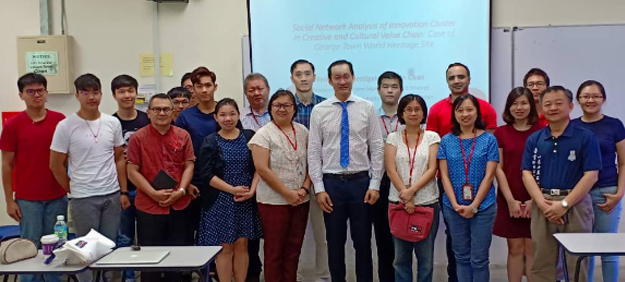


Dr Chan (centre) posing with participants after the talk
The Institute of Chinese Studies (ICS) and Department of Marketing of Faculty of Business and Finance (FBF) co-organised a talk titled “Sustainable Heritage Tourism Development: Entrepreneurship and Innovation in the Community” on 19 April 2019 at UTAR Kampar Campus.
The invited speaker was University of Greenwich, United Kingdom Academic Dr Chan Jin Hooi. Also present were FBF Dean Dr Au Yong Hui Nee, Deputy Dean for Student Development and Industrial Training Yew King Tak, ICS Deputy Dean for Academic Development and Undergraduate Programmes Assoc Prof Dr Wong Wun Bin, heads of departments, staff and students.
In view of sustainability being widely incorporated in various industries, the talk is also an initiative of the university to continuously promote sustainability in education. The talk discussed the impacts of sustainable heritage tourism, and how to maintain sustainability in the respective local areas. It also aimed to encourage participants to incorporate sustainability in various aspects of their researches as the speaker discussed the example of successful local sustainable heritage tourism.
Dr Chan firstly explain that tourism is liken a double-edged sword. “The positive aspects of tourism is its ability to revitalise a community, rural area, small town or deprived city centre. It is able to boost the local economies while enabling the local community to share their culture with the tourists. It is a way to expose to the world about the uniqueness of their local sceneries,” said Dr Chan.
He continued, “At the other end of the balancing scale, there are negative impacts of over-tourism that local governments and communities should look into before majorly expanding the local tourism industry. The drawbacks include generating negative impact to the natural, social, and cultural environments. These negative impacts can caused resentment among the local community, which eventually will lead them to declining the local tourism industry.”
He further explained that sustainable heritage tourism in rural settings and small townships requires greater empowerment and involvement of the local community. He mentioned sustainable heritage tourism as a concerted effort from the local community, which also include the participation and support of active entrepreneurs and innovation endeavours. To boost heritage tourism, he also suggested that a healthy development in the creative industries and cultural sector as a viable solution to enhance long term sustainability.
Dr Chan also used examples of various locations to further discuss about sustainable tourism development. His examples covered Honghe Hani Rice Terrace World Heritage Site and Yuan Village, China; Chi-mei Community in Taiwan; and Penang World Heritage Site, Malaysia.
© 2019 UNIVERSITI TUNKU ABDUL RAHMAN DU012(A).
Wholly owned by UTAR Education Foundation Co. No. 578227-M LEGAL STATEMENT TERM OF USAGE PRIVACY NOTICE